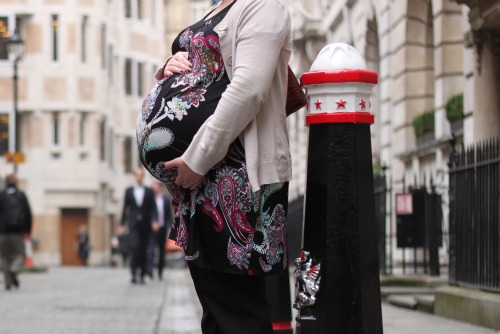Here we are. Pregnant in the UK.

Photo courtesy Elsa Konig
I had a fair bit of anxiety taking the second pregnancy test and went through the motions of seeing my GP again. It was a blessing to be incredibly busy in a new position at work while we waited for the first early scan. However, we were lucky enough because of our history to have three early scans scheduled for us although they are not usually offered before the 12 week scan. When all was confirmed to be progressing normally, we were given a ‘booking appointment’ with a midwife from the hospital for 8 weeks. At a booking appointment you fill in your medical notes; these you carry with you everywhere you go because you see healthcare professionals at multiple locations. You definitely carry your notes with you when you travel so that you can always just hand your antenatal record to a medical professional in any situation where you need to see one. All of this documentation is archived by the hospital after delivery.
At your booking appointment the midwife performs a set of routine checks and conducts a lengthy interview. Then she (or he) answers any questions you may have and walks you through what the rest of your appointments will entail, given that your pregnancy is straightforward, and how they are scheduled.
8-14 weeks– booking in (and dating scan if required, to determine the due date)
12 weeks–Down syndrome screening scan
16 weeks–routine midwife visit
20-22 weeks–scan to assess baby’s growth and mum’s health (placenta, cervix, etc.)
25 weeks–routine midwife visit
28 weeks–routine midwife visit
31 weeks–routine midwife visit
34 weeks–routine midwife visit
36 weeks–routine midwife visit
38 weeks–routine midwife visit
40 weeks–routine midwife visit
41 weeks–routine midwife visit
Routine visits include blood pressure and urine checks as well fetal heart monitoring and a manual check of the position of the baby. At each visit there are unique items to discuss and sometimes blood tests which are recommended to be performed. If there is a complication at any time, you are referred to a specialist. For example, when I complained of a serious spike in migraine activity, I was referred to an obstetrician and a neurologist as well as a midwife acupuncturist. I was lucky that the migraines subsided naturally after 20 weeks and I have only had a small handful of related symptoms since then.
Ultimately the philosophy seems to be that pregnancy is a normal, natural occurrence and requires minimal medical intervention in straightforward situations. I have heard the argument that the approach that the NHS takes is centered around being cheaper, not better for me. Having been a recipient of care in this model I can understand where this argument gets its basis, but I can argue from personal experience that routes of escalation are in place and physicians are available when a midwife reaches her (or his) limit of responsibility. I have also witnessed the expertise of the midwives; it should be pointed out that they attend far more births than physicians. Ask any nurse, the people who provide care day in day out catch things, see things, and usually engage in a more personal way with the patient. An obstetrician is essentially a surgeon (many train in gynecology, especially in the US where midwifery is not standard in the care model, in order to be able to provide more well rounded care to women). Due to the way medical professionals specialise in the UK, there isn’t a need to involve an obstetrician in routine antenatal care.
I am not interested in opening a debate or changing anyone’s mind about whether the system in the UK is better or worse than the care I would have received in the US, but I do want to share what I am learning as well praise the caregivers who have been looking after us. I would like to give our loved ones comfort that we have in fact been looked after though rumor may have had it we were left to the wolves. For my own way of thinking, I am thrilled to have been given the opportunity to experience care from this side of the antenatal philosophy. My GP had a point back in those early days; in some cases, the US care model introduces treatments and interventions that are more costly (some potentially introducing unnecessary risks) due to the way the system operates. Surely there is some middle ground where we could all meet…
Coming next–Birth: preparation, the big push, and the baby’s first month
Followed by–our own personal birth story
Disclaimer: I am given to understand that there are some differences in the care offered by different hospitals based on the needs of the region they serve and due to way that services are managed by trusts in that region.
2 responses to “Pregnant in the UK – Part 3”
So much of the care given in the US is driven by legal liability, as well. You know: If something happens, and we could have done xyz, but didn’t choose to, we could be liable for negligence/incompetence/etc…There’s probably not as many sue-happy people there, since it would be really hard to sue the British government and win. Here in the US, most of us have private insurance through our employers, and have access to private healthcare paid for by a third party, so it’s easier and more lucrative to sue. Sucks, but there you have it.
Can’t wait to hear the birth story!